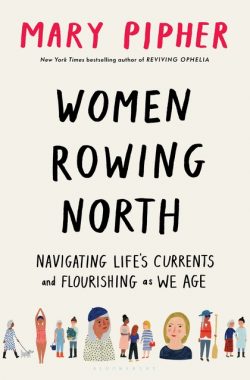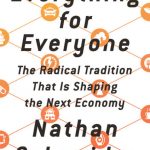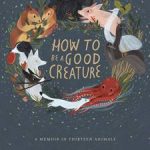Podcast: Play in new window | Download
Subscribe: Apple Podcasts | RSS
We talk with psychologist and celebrated author Mary Pipher about her new book, Women Rowing North: Navigating Life’s Currents and Flourishing As We Age.
Then we take a look back at some of the critical issues covered by the authors we interviewed in 2018. We play clips from seven great conversations with authors Ashley Dawson, Lauren Markham, George Yancy, Anand Giridharadas, Nathan Schneider, Vandana Shiva, and Sy Montgomery.
Please rate us on your podcast app. It really helps to get the word out about this show.
Mary Pipher
 Older women in our culture are at best objects of pity; at worst, of scorn. So you’d think older women would be miserable. But despite the challenges of aging bodies, losses of dear ones and misogyny, older women are deeply happy and filled with gratitude for the gifts of life. Their struggles have helped them grow into the authentic and wise people they have always wanted to be.
Older women in our culture are at best objects of pity; at worst, of scorn. So you’d think older women would be miserable. But despite the challenges of aging bodies, losses of dear ones and misogyny, older women are deeply happy and filled with gratitude for the gifts of life. Their struggles have helped them grow into the authentic and wise people they have always wanted to be.
That’s what Mary Pipher discovered when she set out to write a book about women navigating the challenges of growing older. She is best known for her book about adolescent girls, Reviving Ophelia.
Now, in her new book, Women Rowing North, Pipher examines the cultural and developmental issues women face as they age and explores how women can cultivate resilient responses to the challenges they face.
Mary Pipher is a clinical psychologist and the bestselling author of Reviving Ophelia, along with nine other books.
Looking Back At 2018 on Writer’s Voice
The end of the year is the time for media folks to make Best of the Year lists. The dilemma is, there are always way more “bests” than can fit on a page or a broadcast. So instead, we decided to focus on some of the critical issues covered by authors we spoke with this year.
Climate Change: Ashley Dawson
 Ashley Dawson’s book Extreme Cities explores how climate change, capitalist urban development and extreme inequality are inextricably linked. New York City is his prime example, but he also travels further afield, to places like Louisiana, Indonesia and the sprawling megacities of the African continent to show how the global drive for profits and endless growth are endangering our survival. (Listen to the entire interview here.)
Ashley Dawson’s book Extreme Cities explores how climate change, capitalist urban development and extreme inequality are inextricably linked. New York City is his prime example, but he also travels further afield, to places like Louisiana, Indonesia and the sprawling megacities of the African continent to show how the global drive for profits and endless growth are endangering our survival. (Listen to the entire interview here.)
Immigration: Lauren Markham
 In her book The Faraway Brothers, Lauren Markham tells the story of two young migrants who fled gang targeting at home to make a life in America. They nearly died in the desert on the US side of the border. But they made it to California, joining their older brother who had migrated before them. Markham’s remarkable tale brings home the promise and peril that immigration means for so many children in America today. (Listen to the entire interview.)
In her book The Faraway Brothers, Lauren Markham tells the story of two young migrants who fled gang targeting at home to make a life in America. They nearly died in the desert on the US side of the border. But they made it to California, joining their older brother who had migrated before them. Markham’s remarkable tale brings home the promise and peril that immigration means for so many children in America today. (Listen to the entire interview.)
Racism: George Yancy
 George Yancy’s book Backlash: What Happens When We Talk Honestly About Racism in America? grew out of his 2015 New York Times op-ed “Dear White America” and the vitriolic backlash he experienced from many white readers in response. It’s a searing exploration of white privilege and its impact on its victims. (Listen to the entire interview.)
George Yancy’s book Backlash: What Happens When We Talk Honestly About Racism in America? grew out of his 2015 New York Times op-ed “Dear White America” and the vitriolic backlash he experienced from many white readers in response. It’s a searing exploration of white privilege and its impact on its victims. (Listen to the entire interview.)
Economic Inequality:Â Anand Giridharadas
 Economic inequality continues to get more extreme, both in the U.S. and world-wide. Some of the elite perched at the stratospheric heights of the global economy have positioned themselves as saviors with a particular brand of plutocratic philanthrocapitalism. Anand Giridharadas’s book Winners Take All takes on the myth that those who cause poverty can solve it by using the very methods that brought them their extreme wealth.
Economic inequality continues to get more extreme, both in the U.S. and world-wide. Some of the elite perched at the stratospheric heights of the global economy have positioned themselves as saviors with a particular brand of plutocratic philanthrocapitalism. Anand Giridharadas’s book Winners Take All takes on the myth that those who cause poverty can solve it by using the very methods that brought them their extreme wealth.
The Cooperative Solution: Nathan Schnieder
 It’s not all gloom and doom. Like a body’s immune system, people are confronting the challenges we face with democratic solutions. The growing cooperative movement is challenging the despotism of corporate capitalism. Cooperatives already comprise 10% of the global economy. In his book, Everything For Everybody, Nathan Schneider chronicles this revolution. (Listen to the entire interview.)
It’s not all gloom and doom. Like a body’s immune system, people are confronting the challenges we face with democratic solutions. The growing cooperative movement is challenging the despotism of corporate capitalism. Cooperatives already comprise 10% of the global economy. In his book, Everything For Everybody, Nathan Schneider chronicles this revolution. (Listen to the entire interview.)
The Seed Freedom Solution: Vandana Shiva
 One type of cooperative is the seed cooperative. We spoke with legendary agro-activist Vandana Shiva about her book Creative Nonviolence. It shows how ordinary farmers in India are countering the efforts of Monsanto and other corporations to patent and control the global seed supply. (Listen to the entire interview.)
One type of cooperative is the seed cooperative. We spoke with legendary agro-activist Vandana Shiva about her book Creative Nonviolence. It shows how ordinary farmers in India are countering the efforts of Monsanto and other corporations to patent and control the global seed supply. (Listen to the entire interview.)
The Respect For All Sentient Beings Solution: Sy Montgomery
 We end this year with a reminder of the gifts we receive from the creatures who share the planet with us. If we are to survive, we must honor the web of life that sustains us. We must get rid of the notion that we are entitled to dominion over animals. We must instead be in communion with them. No writer embodies this more than Sy Montgomery. Her memoir How To Be A Good Creature, reflects on the lives of thirteen animals she has known and the wise lessons they taught her. (Listen to the entire interview.)
We end this year with a reminder of the gifts we receive from the creatures who share the planet with us. If we are to survive, we must honor the web of life that sustains us. We must get rid of the notion that we are entitled to dominion over animals. We must instead be in communion with them. No writer embodies this more than Sy Montgomery. Her memoir How To Be A Good Creature, reflects on the lives of thirteen animals she has known and the wise lessons they taught her. (Listen to the entire interview.)

